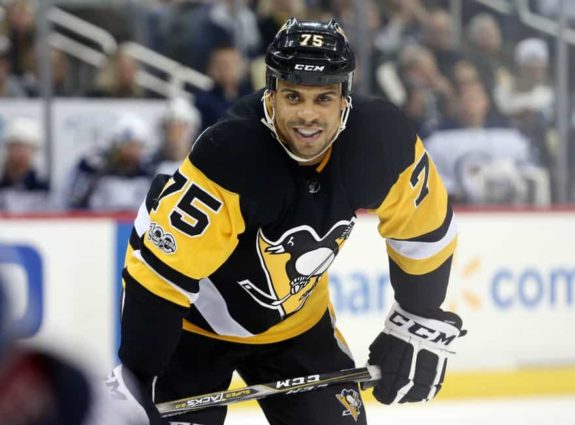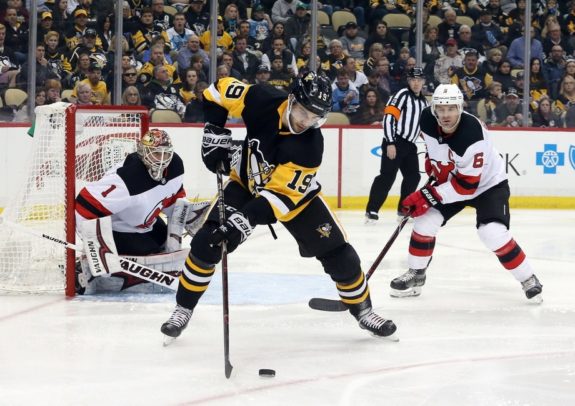Everyone initially agreed the Pittsburgh Penguins overpaid for then-St. Louis Blues forward Ryan Reaves. Three years later, time has simply confirmed that to be the case… and then some.
Reaves Traded to Penguins
Granted, it’s not like the Blues got a superstar out of the deal, at least not yet. In the trade, which saw Reaves go to the Penguins with a 2017 second-round pick (Zachary Lauzon), the Blues picked up everyday contributor Oskar Sundqvist and a 2017 first-round pick.

For some perspective, think along the lines of the widely panned trade the Lightning made to get Barclay Goodrow at this past trade deadline. Even if the then-Stanley Cup champion Penguins got back a second-round pick instead of the third the Lightning did, the Reaves trade was arguably worse for several reasons:
- Goodrow is capable of putting up 30-plus points a season, while Reaves has maxed out at 20.
- The Lightning got Goodrow for potentially two Stanley Cup runs.
- In contrast, the Penguins would only have gotten a single season out of Reaves as they acquired him the summer before his deal was set to expire.
The key terminology there is “would only have,” because, before Reaves’ deal could expire, the Penguins opted to deal him at the following trade deadline to the Vegas Golden Knights (who hilariously made it to the Stanley Cup Final, with Reaves getting in 10 playoff games). The Pens got eliminated in Round 2 to the eventual-Stanley Cup-champion Washington Capitals.
Penguins Mess with Success
Keep in mind the Penguins currently own the longest active playoff streak in the NHL at 13 seasons. Back at the 2018 deadline, when they traded Reaves, they were en route to a 100-point season, finishing second in the Metropolitan Division and in little danger of missing the playoffs.
In fact, the Penguins went 12-7-2 the rest of the way (a 101-point pace) after trading him, further solidifying their hold on a playoff spot that season. Oddly enough, the Penguins went the other way with the Golden Knights deal, opting for skill over size by acquiring Derick Brassard, who was also in severe decline at the time, for Reaves and a fourth-round pick.

Ironically, whereas Brassard continued to bounce around the league somewhat, Reaves found a home with the Golden Knights. The two-year, overly rich extension Reaves signed in the summer of 2018 to stay on in Vegas is set to expire at the end of this season, whenever that will be, but Reaves has nonetheless become a fan favorite, and justifiably so for his work ethic.
In that sense, this piece is not meant to be an indictment of Reaves’ ability to contribute. It’s more of a testament of Blues general manager Doug Armstrong’s ability to get as much as possible for an undeniable fourth-liner… and eventually build a Stanley Cup winner.
Sundqvist Pans Out for Blues
No, Sundqvist is not what you call a star, but he has developed into a solid middle-six forward whereas he had been a simple, seldom-used depth piece for the Penguins. The four points he scored with the Penguins over parts of two seasons? He more than doubled them with nine during the Blues’ championship run last spring. Sundqvist then parlayed that success into an affordable four-year, $11 million extension and, not one to rest on his laurels, would have been on pace to score around the 31 points he did last season.

If Sundqvist had been all the Blues got for Reaves, the deal would have been a clear-cut victory. However, add that first-round selection into the mix and the deal becomes a veritable steal, especially seeing as they picked center Klim Kostin, who’s coming along nicely in the American Hockey League, with 30 points in 48 games with the San Antonio Rampage this season.
Maybe the Penguins saw their first-round pick at No. 31 that season as being a crapshoot. However, heading in, Kostin was actually ranked as the top European skater, ahead of Elias Pettersson. Obviously, he’s not better, but his upside is undeniable.
Sure, Kostin remains an uncertainty, but whatever he ends up bringing to the table is gravy. The beauty of the Reaves trade is it’s effectively, already paid for itself and then some. From here on out, it can only get better.